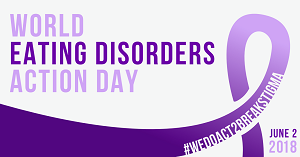Obliterating parent stigma in eating disorders
Obliterating parent stigma in eating disorders

by Judy Krasna
There are many damaging stigmas surrounding eating disorders, but the one that I am most passionate about removing is parent stigma, aka “blame the mother.”
Sadly, some clinicians still subscribe to the outdated and disproven theories of Hilde Bruch (The Golden Cage, 1978) and Salvador Minuchin (Psychosomatic families: Anorexia nervosa in context, 1978) about how parents and family dynamics cause eating disorders. I have met some of those clinicians. To my great dismay, they have treated my daughter—not surprisingly, without success.
If I really wanted to give these clinicians the benefit of the doubt, to a degree I can see how the egregiously false perception that people with eating disorders have controlling and overbearing mothers comes into play.
When my daughter first exhibited signs of an eating disorder, I scoured the Internet for information. I read about how early diagnosis and treatment can positively affect outcome, and how eating disorders carry the highest mortality rate of any psychiatric disorder. Those words “mortality rate” gripped my heart with icy fear.
When clinicians misinterpret symptoms
I did what any good parent would do; I brought my daughter to our pediatrician. Unfortunately, he was not well trained enough to recognize eating disorders, and he took my daughter at her word when she insisted that nothing was wrong. My instincts screamed that she had an eating disorder, and that her condition was getting worse at an alarming rate. I could see her disappearing right in front of my eyes, mind, body, and soul, and it terrified me. I felt myself losing my child. At every turn, those words “mortality rate” haunted me.
The more scared I was, the harder I pushed back against the pediatrician and challenged his assessment of my daughter. Misreading my fear and concern for my child as my being controlling and overbearing, he implied in a not very subtle manner that I needed to back off and chill. Thankfully, I exercised my fundamental maternal instinct to protect and preserve the health and life of my child. I did not back off, and I certainly did not chill. Yes, my dogged pursuit of help for my daughter who claimed that she didn’t have an eating disorder made me look controlling and overbearing, but if I had listened to the pediatricians “advice” and backed off, my daughter would probably be dead.
Parents made to feel guilty
My relief at finally getting treatment for my daughter was short lived upon discovering that her treatment team believed from the outset, without having met us, that my husband and I must have caused our daughter’s eating disorder. As parents, we were stigmatized, which made us feel guilty, worthless, ineffectual, and ashamed. This added to the trauma of the experience of having a very sick child and put us in a far worse position to be able to support our daughter.
At first, I accepted the stigma. I didn’t realize that I had the option of rejecting it. But after a few months of serious doubt as to whether my daughter’s condition was improving or worsening, I went back to the Internet and started reading about Family Based Treatment (FBT) and the inclusion of parents in treatment.
Solution: include parents as partners in treatment
I realized that there is another way, a better way, a more effective way of treating eating disorders. I realized that there are clinicians who view parents as their partners in treatment, and who actually welcome and value the involvement of parents. They see parents as part of the solution, and not as part of the problem. This realization empowered me to throw off the parent stigma that had been unjustly and unfairly thrust upon me, and to find different treatment for my daughter which allowed for parental participation. It was only after we started this treatment that her condition began to improve.
My primary frustration regarding parent stigma is not about parents feeling slighted or disrespected, it’s about the harmful reality that parents who are stigmatized cannot possibly be included in their child’s treatment, and that hurts the patient most of all. Support is a critical factor in eating disorder recovery and, in most cases, parents are in the best position to provide that support. If they are excluded from the treatment team and process, it can be as detrimental as depriving a patient of oxygen.
When I go to the International Conference on Eating Disorders, I am pleased and gratified to meet many clinicians who use FBT and other methods of treatment which include families. For them, parent stigma is obsolete. I fervently hope that others will follow suit, and that parents who are in the position to support their children through treatment will be given the opportunity to do so, without stigma or bias.
About Judy
Judy Krasna is the mom of four, including a daughter with an eating disorder, and the grandmother of an adorable baby girl. She is a professional event planner. She is also an eating disorders parent advocate in Israel, where she lives. Judy is the co-chair of the AED’s Patient/Carer Committee, Patient/Carer SIG (Special Interest Group) and the founder of F.E.A.S.T.’s Israel Task Force. In addition to offering peer support to fellow parents, Judy writes a blog on Times of Israel that is mostly centered on eating disorder related issues. She can be reached at jkrasna@gmail.com.
 Take part in World Eating Disorders Action Day
Take part in World Eating Disorders Action Day
World Eating Disorders Action Day on June 2, 2018 is a grassroots movement designed for and by people affected by an eating disorder, their families, and the medical and health professionals who support them. Uniting activists across the globe, the aim is to expand global awareness of eating disorders as genetically linked, treatable illnesses that can affect anyone. The Third Annual #WorldEatingDisordersDay will take place on June 2, 2018 with a focus on breaking stigma about Eating Disorders. #WeDoAct2BreakStigma.
Join the virtual campaign on social media and host a local event to share information and advocate for policy change to ensure access to evidence based treatment for all affected.





